Dr. Kontou is presenting Shuocheng Guo’s and her research on their empirical analyses that uncovered disparities in California electric vehicle rebates allocation, during the 2021 WSTLUR conference. Her presentation is on August 11th 4-4:45pm central. A 5- minute video on her research is available. The paper was published in Energy Policy earlier in 2021 and is openly accessible here: https://doi.org/10.1016/j.enpol.2021.112291.
News
Comment on WCIA on the President’s ambitious transportation electrification plan!
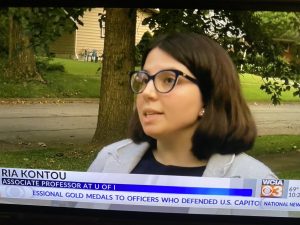 Dr. Kontou appeared and was commented during the night news of WCIA on the US Administration’s plan to electrify the 50% of the US passenger vehicle sales in 2030!
Dr. Kontou appeared and was commented during the night news of WCIA on the US Administration’s plan to electrify the 50% of the US passenger vehicle sales in 2030!
EV charging infrastructure roadmap project, funded by IDOT!
Excited to announce that our research group received funding ($238,415) by the Illinois Department of Transportation to conduct research on our state’s EV charging infrastructure deployment needs. Our research will identify the electrification pathways to meet 2035 greenhouse gas reduction goals for Illinois, and have a detailed plan in place for vehicle electrification charging requirements. The optimal charging infrastructure investment allocation and placement in the Illinois highway network will be presented. Our work will provide Illinois Department of Transportation with a model and report that will enable quantification of the number and the highway location of electric vehicles charging stations deployed to meet the 2035 EV travel demand. The report will quantify electrified miles traveled, environmental externalities (carbon dioxide and greenhouse gas emissions) reduction benefits, as well as the capital and operational costs of deployment of the recommended level and numbers of charging. More info here: https://rosap.ntl.bts.gov/view/dot/65679#tabs-2.
Presentation during the 2021 ISTDM Conference organized by University of Michigan!
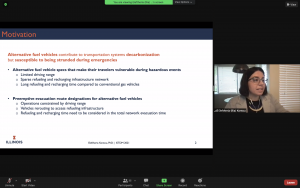 We presented our research with PhD student, Denissa Purba, and Prof. Chrysafis Vogiatzis this Thursday Jun 24, 2021 on alternative fuel vehicle evacuation planning during the 2021 ISTDM conference!
We presented our research with PhD student, Denissa Purba, and Prof. Chrysafis Vogiatzis this Thursday Jun 24, 2021 on alternative fuel vehicle evacuation planning during the 2021 ISTDM conference!
Kontou invited to be a member of the Transportation Research Part C journal Early Career Editorial Advisory Board!
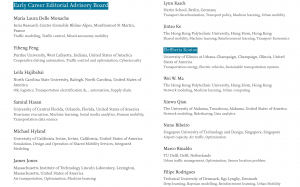 Dr. Kontou was invited as a member of the Early Career Editorial Advisory Board (EAB) of the Transportation Research Part C: Emerging Technologies journal! This board is equivalent to the conventional EAB, but a special title was given to promote and give opportunities to junior scientists (mainly junior Assistant Professors)! As of May 2021, TRC has a CiteScore of 12.2, an impact factor 6.077, a 5-year impact factor 7.080, and a SJR 3.342.
Dr. Kontou was invited as a member of the Early Career Editorial Advisory Board (EAB) of the Transportation Research Part C: Emerging Technologies journal! This board is equivalent to the conventional EAB, but a special title was given to promote and give opportunities to junior scientists (mainly junior Assistant Professors)! As of May 2021, TRC has a CiteScore of 12.2, an impact factor 6.077, a 5-year impact factor 7.080, and a SJR 3.342.
Kontou is invited to the 2021 US FOE Symposium!
Excited for the opportunity to participate in the 2021 US Frontier of Engineering Symposium organized by the National Academy of Engineering! Glad to be part of the 100 early career participants who were invited from industry, research, and academia. More info here: https://www.naefrontiers.org/197388/2021-US-Frontiers-of-Engineering-Symposium. The announcement posted in the CEE website can be found here.
Undergraduate researcher Balisi wins honorable mention during the 2021 Undergraduate Research Symposium!
Congrats, Simon Balisi!
Simon, mentored by PhD student Denissa Purba, received the Numbers and Computation section honorable mention during the 2021 Undergraduate Research Symposium for our poster “Charging Station Location Study to Support Electric Vehicle Evacuation Preparedness“!
More info here: https://blogs.illinois.edu/view/6204/2114603494.
Undergraduate students present their research during Undergraduate Research Week!
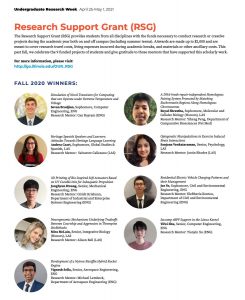
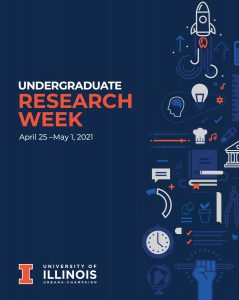 This year our group mentored two undergraduate researchers who conducted sustainable transport research. Tinghan (Joe) Ye from the department of civil and environmental engineering presented his work during the Undergraduate Research Week on residential electric vehicle charging data analytics and Simon Balisi from the department of industrial engineering modeled chargers deployment for electric vehicle evacuations. Simon was advised by PhD student Denissa Purba through the Undergraduate Research Apprenticeship program of UIUC and Joe was advised by Prof. Kontou and received a research support grant.
This year our group mentored two undergraduate researchers who conducted sustainable transport research. Tinghan (Joe) Ye from the department of civil and environmental engineering presented his work during the Undergraduate Research Week on residential electric vehicle charging data analytics and Simon Balisi from the department of industrial engineering modeled chargers deployment for electric vehicle evacuations. Simon was advised by PhD student Denissa Purba through the Undergraduate Research Apprenticeship program of UIUC and Joe was advised by Prof. Kontou and received a research support grant.
Energy Policy paper on disparities in electric vehicle rebates allocation is published!
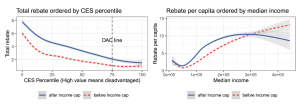
Our research examining equity issues of electric vehicle rebate allocation was published open access in Energy Policy. The paper was coauthored by Shuocheng Guo and Dr. Kontou; Shuocheng completed this research as part of an independent study under Ria’s advisement before completing his MS degree at UIUC! A brief overview and major findings of this research are presented below:
Overview: Incentives such as electric vehicle rebates assist with alleviating high capital costs of alternative fuel cars. We uncover distributional effects of plug-in electric vehicle rebates, focusing on a program in the State of California. We use economic attributes representative of populations of census tracts as well as data on rebates distributed to plug-in electric vehicle buyers through the Clean Vehicle Rebate Project from 2010 to 2018. Horizontal and vertical equity coefficients are computed, while measurement of spatial association characterizes spatial patterns of rebates allocation across the State. We evaluate the distributional fairness of rebates allocation between income groups and disadvantaged communities.
Major findings: We find that rebates have been predominantly given to high income electric vehicle buyers. However, the share of rebates distributed to low-income groups and disadvantaged communities increased over time and after an income-cap policy was put into effect. Spatial analysis shows high spatial clustering effects and rebates concentration in major metropolitan regions. We reveal neighborhood effects: communities with lower median income or disadvantaged receive higher rebate amounts when these are geographic neighbors to clusters characterized as high rebate amount receivers.
By assessing electric vehicles rebate allocation equity, we highlight potential criteria and directions for future policy design. Equitable incentive design could make a difference in the uptake of electric vehicles in disadvantaged and low-income communities!
Shirley and Xi win the Pecan Street Vehicle-to-Grid University Challenge!
A team of Kontou research group graduate students, Shanshan (Shirley) Liu (team leader) and Xi Cheng, won the Vehicle-to-Grid University Challenge, run by Pecan Street. Congrats! This competition served as a great opportunity for our graduate students to use empirical data and deploy their state-of-the-art mathematical models to solve the problem of battery electric vehicle-to-grid services management. Their recognition exemplifies the broader impacts of our research that can provide answers to real-world industry challenges.
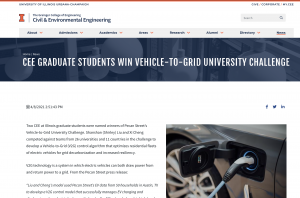 The department of Civil and Environmental Engineering covered their win here: https://cee.illinois.edu/news/cee-graduate-students-win-vehicle-to-grid-university-challenge. More info provided by Pecan Street on their solution here: https://www.pecanstreet.org/2021/04/v2gwinner/
The department of Civil and Environmental Engineering covered their win here: https://cee.illinois.edu/news/cee-graduate-students-win-vehicle-to-grid-university-challenge. More info provided by Pecan Street on their solution here: https://www.pecanstreet.org/2021/04/v2gwinner/
